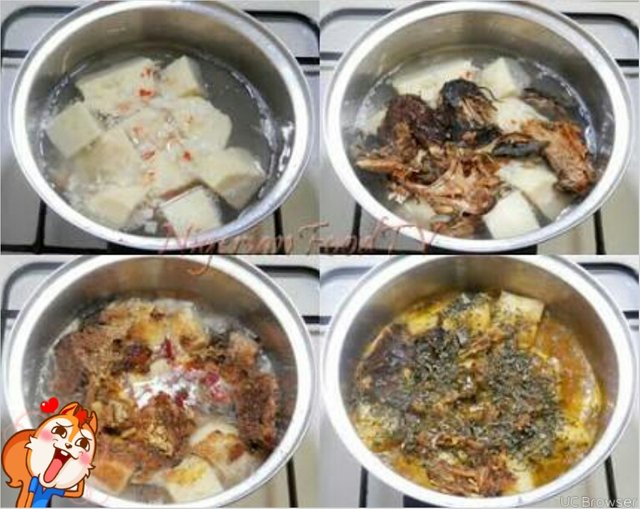About My Culture, An @sndbox Cultural Challenge. Omugwo (After-Birth Care) Among The Igbos Of Nigeria.

Image credit
All around the globe, the arrival of a child is invariably greeted with intense excitement and euphoric celebration. This is not only to the parents but to all other persons related or close to them. The Igbos ( a majority ethnic group in Nigeria ) are not left out as they have an ancient custom that highlights the significance of childbirth and most importantly the exigency of post natal care of nursing mothers. This ancient traditional care administered to nursing mothers and their babies is known as omugwo.
Omugwo is an age long and widely practised custom in Igbo land that describes the practice of administering care unto a nursing mother and her baby by a close relative who most times happens to be the mother or mother-in-law. In cases, where both mothers are deceased, an aunt or an elderly sister performs the ritual.
During the omugwo period, the nursing mother doesn't do anything apart from eating, breastfeeding her baby, bathing, relaxing, sleeping and receiving visitors. The grandma who came for the omugwo does the whole cooking and home chores. This enables the nursing mother to regain her strength and acclimatise herself to motherhood. The new mother is equally prohibited from having sex during this period as it forecloses the possibility of inadvertent conception. All these are done to enable the mother bounce back and give her baby full attention.
A special and strict kind of diet is prepared for the nursing mother during this period. We have the ji mmiri oku (yam peppersoup garnished with assorted fish ), ofe nsala (white soup ) with pounded yam and sometimes akamu (pap ). The soups are fixed with a blend of spices congruent for nursing mothers. These spices include : uziza ( West African Pepper ); ehuru ( calabash nutmeg ) and uda ( African Negro pepper ). The idea of feeding a nursing mother with lots of sizzling spicy soups is to enhance breast milk production and also to expel lochia or blood clots from the nursing mother ‘s body.
I chose to write on this aspect of my culture because of its relative significance and importance to childbirth and health of nursing mothers. The omugwo ritual takes into consideration of the fact that women suffer a great deal before and during childbirth. They lose much nutrients and blood and most of them experience chloasma or darkening of the skin. Omugwo thus comes in handy as it gives room for the nursing home mother to recuperate and bounce back from the stress of the nine month pregnancy course. This alternative therapy predates orthodox medicine. Our ancestors must have been thoughtful indeed.
Omugwo is characterised by a number of hot water treatments and massages. The grandma bathes the nursing mother twice per day with hot compresses applied to the abdominal and genital areas. This facilitates quick healing of the vagina. Sitz bath is also recommended as well. The new born baby is not left out too. With a towel dipped intermittentl in hot water, the grandma meticulously massages and bathes the baby. This makes the baby flexible with his /her head, limbs and buttocks well structured. During this period also , the baby is circumcised if the baby were a male. The circumcision comes up after eight market days after childbirth. The naming ceremony is conducted within this period too.
In the olden days, the nursing mother makes a special appearance at the market square during the end of the three months omugwo period. This is her first appearance in public. She dances with her baby and is showered with gifts. Due to the advent of Christianity in Igbo land, this elaborate occasion is now replaced with child dedication in the church where the baby and the mother are being prayed for by the priest or pastor as the case may be.
Approaching the time the grandma or the person who conducted the omugwo will go, special provisions of new wrappers and other gifts are showered on her. It is believed that the new baby had ruined her wrappers with excrement and as such should be replaced.
The overall importance of omugwo to my culture cannot be overemphasised. Omugwo is special to me and my culture as it stills remains one of the most vibrant aspects of Igbo age long culture and tradition. Despite the ravages of time, its bare lineaments which entail communal love, family bond and cultural freshness remain ever green. To tell you how serious omugwo is, most Igbo families resident overseas always ensure that their grandmas come abroad no matter the cost, in order to grace the omugwo ritual. Interestingly, many ethnic groups in Nigeria have integrated this aspect of the Igbo culture into theirs. All in all, it recognises the intelligence of our ancestors in finding solutions to their problems




A fascinating read. This reminded me when my wife had our child. In her culture there are many rituals (dietary, rubs, wraps, treatments, caring for the woman, child, etc) that were very foreign to me, but looking back were amazing and really underscored the value of human life. Here in America, we over-medicalize the child bearing experience. Basically, a bunch of hospital tests leading up to delivery, then delivery, then care for the baby for a couple weeks, then back to work while you pay someone to raise your child...seriously fucked up if you ask me. The slower, more thoughtful, traditional methods seem so much more healthy and human.
Wow! Thank you so much for this. I appreciate. Please, I have a problem. This is actually an entry for a contest and I posted twice, how can I delete one? Please help.
Hey @zubby, I don't think you can actually delete the post once it gets attached to the blockchain. I know you can click "edit" empty out the contents of the post and change the post's title to "Deleted" just to remove the duplicate content. Hope this helps.
Thanks a bunch. It worked.
No worries, glad to help :)
Thanks for using the wafrica tag! @wafrica can give just one upvote per day!
Thanks for using the wafrica tag! @wafrica can give just one upvote per day!
Thanks for using the wafrica tag! @wafrica can give just one upvote per day!
Thanks for using the wafrica tag! @wafrica can give just one upvote per day!
Thank you very much. You the community has been supportive.
Congratulations @zubby! You have completed some achievement on Steemit and have been rewarded with new badge(s) :
Click on any badge to view your own Board of Honor on SteemitBoard.
For more information about SteemitBoard, click here
If you no longer want to receive notifications, reply to this comment with the word
STOPWow, such a great read. We have it also in my culture, the Ibibio people of Akwa Ibom state, but I can't remember the name we call it in my side. Nice to read a little about the Igbo, I don't know if I'll one day be an Inlaw. Lol.
Congratulations @zubby! You received a personal award!
You can view your badges on your Steem Board and compare to others on the Steem Ranking
Do not miss the last post from @steemitboard:
Vote for @Steemitboard as a witness to get one more award and increased upvotes!
Congratulations @zubby! You received a personal award!
You can view your badges on your Steem Board and compare to others on the Steem Ranking
Vote for @Steemitboard as a witness to get one more award and increased upvotes!